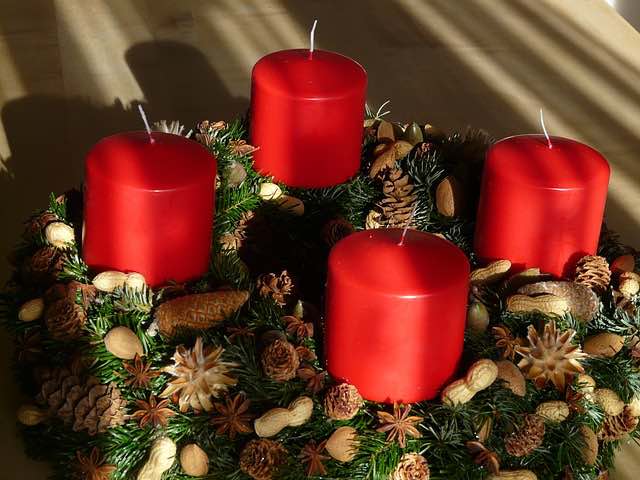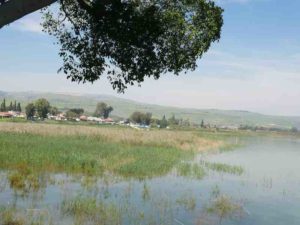John the Baptist, in expectation of the Messiah
In the period of Advent, near by Christmas, we are waiting for the Messiah. During these days we like to think over a few people mention who were waiting for the Messiah:
– Zechariah and Elizabeth who were « upright in the sight of God », a faithful couple who thought never to have children ;
– Simeon, the Righteous, who was waiting for the “consolation of Israel” and upon whom the Holy Spirit was ;
– Ann, the old lady, 84 years old, a widow and a prophetess. Luke tells us that she did not depart from the Temple, “waiting” and taking part in the worship night and day, with fasting and prayers,
– And many others who certainly reread the promises of the prophets, awaiting the coming of the Messiah.
Let us ponder a short passage in the gospel of Matthew which is in the beginning of Jesus’ ministry.
1. John the Baptist, the forerunner, preparing the way for the Lord
This is the forerunner, John the Baptist, the son of Zechariah and Elizabeth, who prepares the way of the Lord, who baptizes the crowds in the desert. He recognized in Jesus the Lamb of God who takes away the sins of the world. A great man, one of the very greatest of the prophets, says Jesus.
He clearly recognizes that Jesus is the Son of God (John 3: 34). He is only the precursor, the one who prepares the way and the hearts to welcome the Savior of the World.
In the gospel of John, John the Baptist defines his own role and that of Jesus pictorially. John the Baptist is not the Messiah. He is the one who proclaims his coming, He is a friend, the friend of the bridegroom, as he is called in chapter 3 of the gospel (v.29). He is rejoicing for the bridegroom, for Jesus.
Having known and met God, his joy is complete. It leaves room for Jesus. He is the one who is first part of a concert. He warms up the attendance for the star who will come after him. His role is important. While filling in the time for the audience who came to hear the singer or the star singer, he allows them to get in the mood, to be receptive to what will follow. This is his main talent. Each has his place, his role to play!
To recognize Jesus as the Messiah, that is to say the one whom God sends to go to meet mankind, must have been easy to John the Baptist, as an actual meeting face to face had taken place.
Yet the evangelist Matthew tells us the following event (Matthew 11: 2-6):
When John, who was in prison, heard about the deeds of the Messiah, he sent his disciples to ask him, “Are you the one who is to come, or should we expect someone else?” Jesus replied, “Go back and report to John what you hear and see :The blind receive sight, the lame walk, those who have leprosy are cleansed, the deaf hear, the dead are raised, and the good news is proclaimed to the poor. Blessed is anyone who does not stumble on account of me.” Or Happy is he who does not lose faith because of me.” (New International Version)
Doubt after enthusiasm
In John the Baptist’s mind the enthusiasm of the first encounters and the first certainties make room for doubt. Because of his disturbing preaching, he is now at the bottom of a prison. So many words and deeds have confirmed John in the certainty that Jesus is indeed the long awaited Messiah.
Now he is no longer quite sure. He can no longer decide on actual evidence, because he is locked and therefore deprived of liberty. That is why he asks his disciples to ask the person concerned himself.
Are you the Christ?
Who is this Jesus? John the Baptist’s question is surprising. Did he not spend his entire life to prepare the way for Jesus, who will baptize in the Holy Spirit and in fire. John has not given up his faith. Jesus said that he is the greatest of the prophets (v.11). John had introduced the Messiah to come in Matthew. 3: 7, 12, as a judge. In prison because of his radical message and oh his intransigence, he considers the actions of Jesus and wonders if the announced judge is yet to come?
John is perplexed, he doubts, is he mistaken? He meditates in his prison, he remembers the hours spent at the Jordan, the crowds who came to hear, the baptisms … the conversions. He recognized the Messiah and he was ready to withdraw before him ; and now he is in a dungeon, asking a thousand questions.
The message of John the Baptist was all fired up (Matthew 3: 7-10. For the Pharisees and Sadducees who,came to listen to him, John says:
You brood of vipers! Who warned you to flee from the coming wrath? Produce fruit in keeping with repentance. And do not think you can say to yourselves, ‘We have Abraham as our father.’ I tell you that out of these stones God can raise up children for Abraham. The ax is already at the root of the trees, and every tree that does not produce good fruit will be cut down and thrown into the fire.
Is John troubled by that Messiah who travels to every corner of the land and who speaks to the crowds, but does not seize power and does not set himself up as a judge, nor does he wave the whip of anger … This Jesus who is not even moving among the theologians of Jerusalem !
There is violence in the Baptist’s message – there is sweetness in the message of Jesus, in respect of the excluded, the wounded of life, the infirm …
We can notice that John is not the only one who doubted, Peter, Thomas, Elijah the prophet, the Psalmist, Job and many others at some point in their lives have doubted.
Are you the Messiah or should we expect someone else?
2. Jesus’ answer
Jesus’ answer to the messengers of John, v.4-6:
Go back and report to John what you hear and see :The blind receive sight, the lame walk, those who have leprosy are cleansed, the deaf hear, the dead are raised, and the good news is proclaimed to the poor.
No rebuke from Jesus : « Go back and tell John what you hear and see ! »
Let us consider the actions of Jesus in the light of some prophecies
Isaiah 35: 5-6
Then will the eyes of the blind be opened and the ears of the deaf unstopped.
Then will the lame leap like a deer, and the mute tongue shout for joy
Isaiah 61: 1-2.
The Spirit of the Sovereign Lord is on me, because the Lord has anointed me to proclaim good news to the poor. He has sent me to bind up the brokenhearted, to proclaim freedom for the captives and release from darkness for the prisoners, to proclaim the year of the Lord’s favor and the day of vengeance of our God, to comfort all who mourn.
These are the the words which were read in the synagogue at Capernaum
Even though Jesus does not conform exactly to the design which John had of what the Messiah would be, and though Jesus did not – yet – bear the attributes of a glorious king, of a judge, his works confirm what the voice from heaven had said: “This is my beloved Son; In him I am well pleased ”
The previous chapters tell us this: healing and proclamation go hand in hand ; the blind and, the lame witness the love of Christ.
Say to those whose hearts are afraid,
Be strong. Do not fear.
Your God will come.
He will pay your enemies back.
He will come to save you
Isaiah 35: 4
This is the proclamation of the Good News.
And there is another point John must know: the Good News are announced.
John the Baptist was to prepare the way, a daunting, thankless task : he had to clean, to repeat what is good and what is evil, God’s holiness, the judgment to come. Huge crowds came to hear this message and to accept the baptism of repentance.
Jesus is indeed the One sent by God
Jesus welcomes John the Baptist’s question, yes, indeed, he is the messenger of God, the promised One. His actions and words prove it. Now it is up to mankind to “hear and see”.
What do we remember of the events that are happening, to where are our eyes turned? To the imprisoned Johns the Baptist, to the violence of this world, to the injustice and the corruption around us? Or to those who proclaim the Good News, those who relieve the blind and the lame?
Did Jesus want to point that out? Lift up your eyes beyond your prison, John the Baptist, the sun rises, the Kingdom is near …
3. Happy, “Blessed is the man who does not lose faith because of me.”
What a curious negative beatitude! I have not found another one set that way! Could we say positively “Blessed is he who makes no mistake by putting his faith in Jesus”?
Was John the Baptist inclined to see only the judgment side in the coming of the Messiah?
The scandal would be to err on the true nature of the Messiah. Peter was an object of scandal for Jesus when he would not accept that Jesus was to be put to death, when he denied him.
How can Jesus cause someone to fall? Every time I take him for another, for a judge, for an earthly king, and when I begin to forget that he is the son of God, the One who has agreed to come to meet of lost mankind in the guise a small child ..
Jesus? A great man? A great thinker? or the Son of God himself!
For some Jesus was God, but has never been man. He would just have had a human appearance.
Others, on the opposite, saw in him a great man, a philosopher, perhaps a man adopted by God, but by no means God himself.
And then there are those who have tried to strike a balance between divinity and humanity in him : more human than God or more God than human.
Before Christmas we are preparing ourselves to welcome the child Jesus in our homes, therefore the question of John the Baptist is especially important. Without getting lost in panel discussions, let us ask ourselves :
Who is this Jesus? Is he the Messiah? The messenger of God?
nd John the Baptist, when John says: « His influence must become greater and mine less. »At Christmas it’s not an adult who comes to us. If we refer to the childhood stories in the gospels of Matthew and Luke, we find the child Jesus as the focus of the upcoming festival.
That is why the painter, Matthias Grünewald, represented John the Baptist on the Issenheim altarpiece, at the foot of the cross, pointing an overly enlarged finger at the crucified.
At Christmas it’s not an adult who comes to us. If we refer to the childhood stories in the gospels of Matthew and Luke, we find the child Jesus as the focus of the upcoming festival.
All those who have welcomed a child into their lives know that well. When we welcome a child, it is a developing being who comes to take his place in the human community.
He is not intended to remain the little bundle of joy which everyone loves. He will forge a personality and take his place among us. It’s the same for Jesus. Staying with the image of the child Jesus, as wonderful as it may be, is to freeze a moment in his history. But this child, Jesus, is called to grow, to take more and more space in our lives.
This reminds us of the saying about the relationship between Jesus and John the Baptist, when John says: « His influence must become greater and mine less. »
That is why the painter Matthias Grünewald represented John the Baptist on the Issenheim altarpiece, at the foot of the cross, pointing an overly enlarged finger at the crucified.
That is like what we see on the Advent wreath. Initially the discrete light of the first candle has trouble finding its place in the flood of artificial light. Gradually there will be four hot lights, representing the growing presence of Christ who comes to meet us.
John the Baptist prepares us to receive Jesus. He wakes us up from our slumber.
He makes us aware that we need to change our lives, in order to welcome Jesus. He speaks to all men, powerful and humble, all have to reform themselves, each according to his state in life. Yes, the One who comes must increase, but I must step back, to leave it up to Christ.
Making room for Jesus, welcoming him means to reduce the space that we invade. We encumber our lives with so many things that prevent us from discovering Jesus.
Jesus’ contemporaries had not recognized him, starting with the scribes. They read the prophecy in the book of Micah announcing the birth of Jesus in Bethlehem. And what do they do? They remain in Jerusalem!
Besides, nobody was expecting a child as the Messiah!
And you, who do you say that I am?
Maybe we should ask ourselves the question that Jesus addresses to his disciples: « And you who you say I am? »
To the questioning of John the Baptist, Jesus answers as usual in a roundabout way.
Matthew 11. With such signs, Jesus can only be the Messiah. With him everything is possible, everything comes back to life and shape. Joy arises for those who are ready to believe in him.
But there is the word “The blind see, the lame walk …”
By this sign we should recognize the Messiah who is to come from God.
He came, he made the men stand, opened their eyes to see all the good and the love germinating through those who follow Jesus. Often with little noise, simply.
“Good is banal” it seems, so we must be a little careful to perceive it.
But these “witnesses” are signs of the coming kingdom, they allow to believe in the One who came.
Conclusion: “Blessed is he who does not lose faith because of me”
We are invited to prepare ourselves to celebrate the coming of Jesus.
How to prepare the way, to tidy up, to remove the stones, the brambles and the dead branches, to clean, to set up flowers and to decorate?
The wise men, the shepherds have seen the light! They are filled with joy! Having seen and adored the child, they hurried to return home in their everyday life. Their joy is so great that it is overflowing in their words and reflecting on their faces.
They tell what they saw and what they have learned about light: “Get ready, because it comes to you also, this light!
Among those who listen to them, some are hesitating, they cannot believe. Then these witnesses insist: “It has always been, this light! Since the beginning! In it is the life! It comes to enlighten every man and woman in this world. It shines in the darkness, and the darkness cannot stop it. Light comes to live with you ! If you welcome it with confidence, it will make you children of light! »
The joy they provide is so strong that it starts to shine, exactly like a burst of sunshine.
May everyone of us open his heart to the light of the One who is coming, as an expression of his longing for God’s presence with him.“
L.N.



